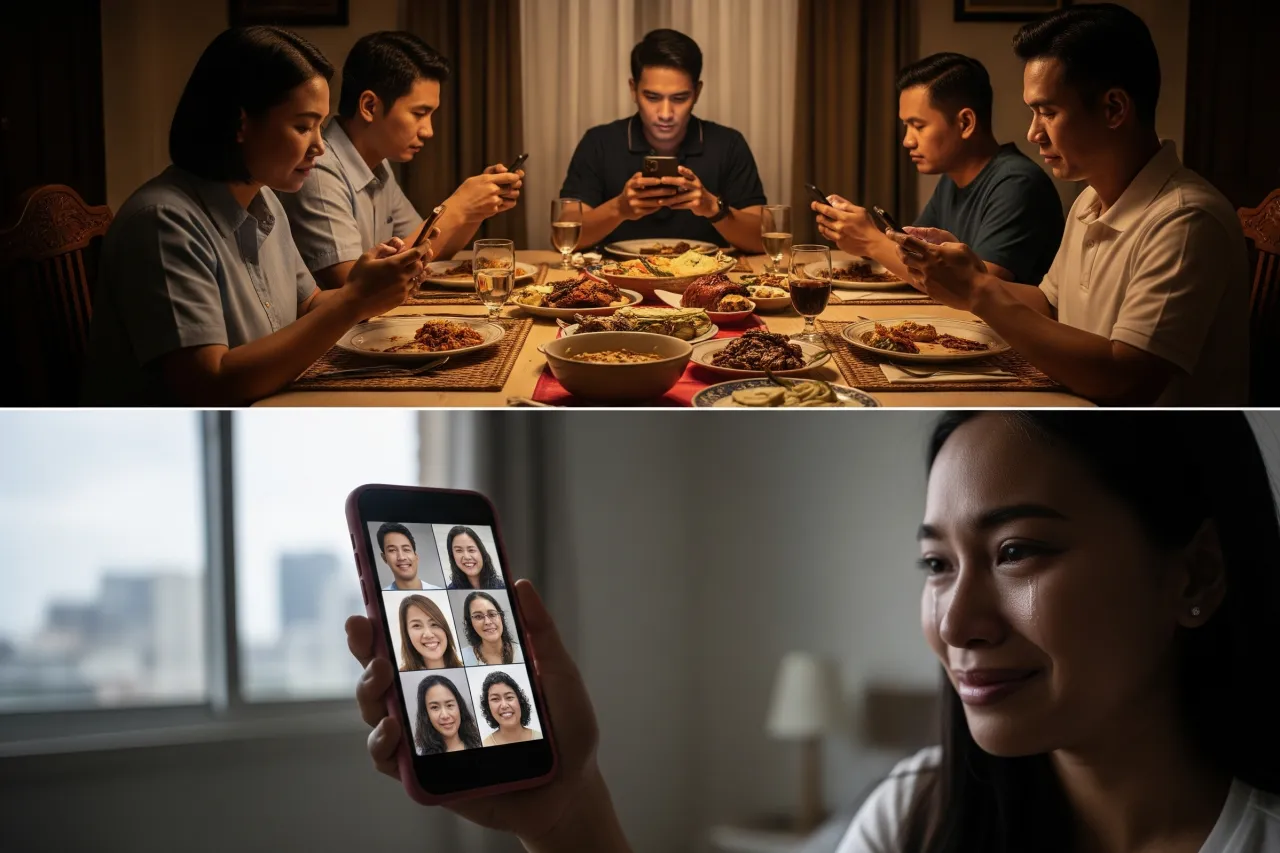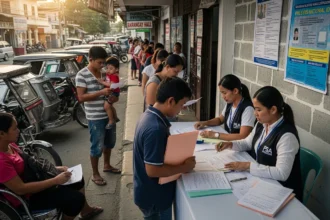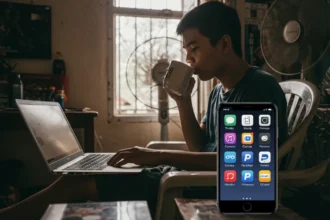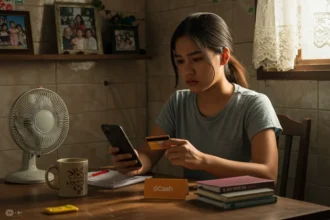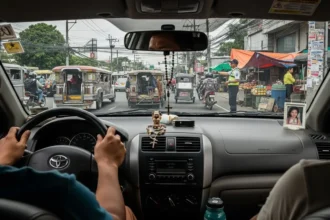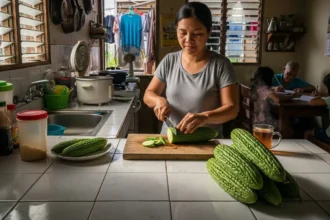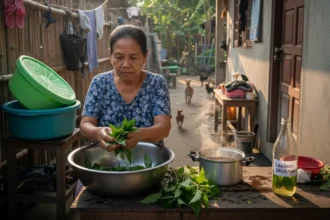It’s Sunday lunch in a typical Filipino home. The dining table is filled with adobo, sinigang, and crispy lumpia-but instead of noisy kwentuhan, everyone’s half-focused on their phones. Your tita is browsing Facebook Marketplace for kitchen deals, the teens are busy making a TikTok, and lola proudly shows off how she “reacted” to her kumare’s new profile picture. Meanwhile, your OFW dad calls in via Messenger video, joining the meal virtually from thousands of miles away.
- 📱 Social Media as the New Family Space
- 🌏 Bridging Distances: OFWs and Long-Distance Families
- 👪 Building Generational Connections Online
- ❤️ Strengthening Filipino Values Through Social Media
- 🏠 Everyday Benefits in the Household
- 🌐 The Community Effect: Social Media as a Filipino Connector
- ⚖️ Balancing Act: The Downsides We Need to Manage
- ✅ Practical Tips for Healthy Social Media Use in Filipino Families
- 🔮 Looking Ahead: The Future of Filipino Families Online
- ❓FAQs About the Benefits of Social Media in Filipino Families
- 🧭 References
This is the modern Filipino family: still bonded by love, tradition, and food-but now with social media as the new glue that keeps everyone connected. And it’s no surprise. The Philippines consistently ranks among the world’s top social media users, with millions of Filipinos spending hours each day on platforms like Facebook, TikTok, Instagram, and Viber.
In this article, we’ll explore the real benefits of social media for Filipino families, how it strengthens our communities, and the challenges we need to balance along the way.
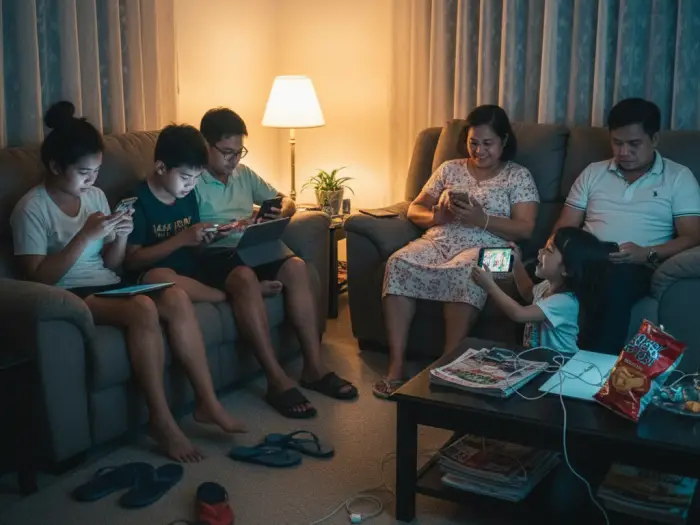
📱 Social Media as the New Family Space
For many Filipinos, social media has become the new family sala-the digital living room where kwento, bonding, and everyday life now happen. Gone are the days when we waited for Sunday reunions just to catch up. Today, with a single tap on Messenger or Viber, you can see your sibling’s new baby picture, laugh at a cousin’s TikTok dance, or update your parents about school or work.
One of the biggest benefits of social media in Filipino families is that it keeps us connected despite busy schedules and physical distance. Even if family members live in different barangays, provinces, or even countries, online platforms make it possible to share stories instantly. Facebook groups, family GCs (group chats), and private photo albums have become the modern-day version of the family photo album, passed around virtually instead of on the living room sofa.
But just like a crowded tambayan, there are downsides too. Overusing social media can lead to less face-to-face interaction at home. Dinner tables sometimes turn quiet because everyone’s focused on their phones instead of real conversations. Still, when used mindfully, these platforms remain powerful tools to keep Filipino families closer than ever.
🌏 Bridging Distances: OFWs and Long-Distance Families
No conversation about Filipino families is complete without mentioning OFWs. For decades, our kababayans abroad have carried the weight of providing for their loved ones back home-often at the cost of missing birthdays, graduations, or even simple Sunday lunches. This is where social media truly shines as a lifeline.
Platforms like Messenger, WhatsApp, and Viber allow OFW parents to read bedtime stories over video call, send instant advice when kids face challenges, or even join family celebrations virtually. These small digital moments might seem ordinary, but they create extraordinary bonds. For many households, the greatest benefit of social media for Filipino families is that distance no longer means disconnection.
Social media also helps in practical ways. Budget discussions can happen in real time, remittance updates are shared instantly, and relatives abroad can stay updated on emergencies or barangay happenings. In many cases, it lessens the homesickness on both ends-kids feel their parents’ presence, and parents feel closer to home.
Of course, there are challenges. The constant expectation to reply quickly can lead to digital stress. Misunderstandings can easily flare up because tone and facial cues are lost in text. Still, for millions of OFWs, social media remains the most reliable diskarte to bridge the emotional and physical gap of working abroad.
📌 Top 5 Ways OFWs Use Social Media to Stay Connected
| # | How OFWs Use It | Benefit for Filipino Families |
|---|---|---|
| 1 | Video Calls on Messenger/Viber | Makes everyday bonding possible-bedtime kwento, birthday greetings, or even shared meals. |
| 2 | Family Group Chats (GCs) | Instant updates on household news, emergencies, or barangay happenings. |
| 3 | Photo & Video Sharing | Parents abroad witness milestones-first steps, graduations, fiestas-without waiting for balikbayan trips. |
| 4 | Financial Coordination | Discuss budgets, track remittances, and plan expenses in real time. |
| 5 | Emotional Support Anytime | Quick reassurance during challenges, boosting closeness despite distance. |
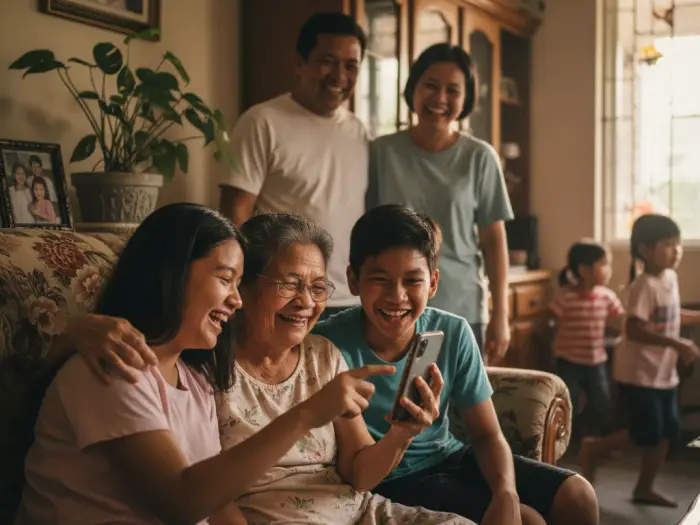
👪 Building Generational Connections Online
One of the most surprising benefits of social media in Filipino families is how it bridges the generational gap. In many homes, lolo and lola are now active on Facebook, proudly reacting to photos and reconnecting with long-lost classmates. Parents use Messenger group chats to organize family events, while teens and young adults bond over TikTok trends and Instagram stories.
This digital overlap creates new opportunities for connection. Grandchildren often become the “tech tutors” of the household, teaching their elders how to post, comment, or even use filters. These small lessons turn into meaningful bonding moments, proving that digital life can bring the young and old closer together.
Of course, challenges exist. Miscommunication can happen when parents don’t understand the “slang” or emojis their kids use. Some elders may overshare personal details online, unaware of privacy concerns. And teens, on the other hand, may roll their eyes when parents or titos comment on every post. Still, these funny little frictions are part of the evolving kwento of Filipino families adapting to modern life.
The key is balance. Social media should not replace genuine face-to-face bonding but should enhance it. Teaching respect for each generation’s digital space-while enjoying shared moments online-allows Filipino families to stay connected without losing personal boundaries.
❤️ Strengthening Filipino Values Through Social Media
Beyond selfies and viral trends, one of the most overlooked benefits of social media in Filipino families is how it helps preserve and amplify our values. Platforms like Facebook, TikTok, and YouTube have become modern extensions of bayanihan, faith, and family traditions.
Take the bayanihan spirit: during typhoons or emergencies, families and neighbors often rally through online donation drives, community group chats, or barangay Facebook pages. This collective diskarte allows help to reach those in need faster than ever before.
Faith and tradition also thrive in digital spaces. Families now attend online misa together, livestream fiestas, or share novena schedules in group chats. Even abroad, Filipinos hold on to their roots by joining community pages dedicated to town fiestas or parish updates.
But there’s a flip side. Social media also makes it easier for fake news, chismis, or divisive political posts to spread quickly within family group chats. What starts as a simple kwento can sometimes cause tension. This is why digital literacy-teaching loved ones to verify sources and think before sharing-has become just as important as passing down values.
When used wisely, social media doesn’t just connect people-it strengthens the cultural fabric that holds Filipino families and communities together.
🏠 Everyday Benefits in the Household
Beyond keeping families connected across distances, social media also brings everyday conveniences right inside the Filipino household. In many ways, it has become part of our daily diskarte-helping with school, chores, shopping, and even bonding time.
For students, class group chats on Messenger or Viber serve as quick homework guides and exam reviewers. Parents, on the other hand, use Facebook groups to swap budgeting tips, find affordable secondhand items, or share recipes that make meals more sulit. Even lola and lolo join the fun, using YouTube to watch health videos, karaoke playlists, or novena prayers.
Entertainment has also become a family affair. Parents laugh along with their kids’ TikTok dances, siblings watch K-dramas together via livestream links, and entire households gather for YouTube cooking tutorials. These shared digital experiences show the lighter benefits of social media for Filipino families-creating simple joys that keep everyone in sync despite busy schedules.
Still, balance is important. Too much screen time can lead to neglected chores, late-night scrolling, or kids stumbling upon unsafe content. By setting house rules-like no phones at the dinner table or scheduled “offline bonding”-families can maximize the perks while avoiding the pitfalls.
🌐 The Community Effect: Social Media as a Filipino Connector
Social media doesn’t just strengthen ties inside the household-it also extends the family spirit into the wider community. For Filipinos, whose culture thrives on pakikisama and bayanihan, online platforms have become modern-day tambayans that keep barangays, schools, and neighborhoods connected.
Barangay Facebook groups are a prime example. Here, kapitbahays share updates about community projects, job postings, lost pets, or even power interruptions. During calamities, these same groups transform into lifelines-coordinating relief efforts, sharing evacuation center details, and raising donations in record time. It’s a real showcase of bayanihan in the digital age.
The diaspora benefits, too. Balikbayans and Fil-Ams easily reconnect with relatives back home, join fiesta livestreams, or contribute to fundraising drives for their hometowns. These digital bridges keep traditions alive and ensure that distance doesn’t weaken cultural identity.
Of course, there are downsides. Online tsismis, fake alerts, or heated political debates can divide communities instead of uniting them. What should be a hub for connection can sometimes become a battleground of opinions.
Still, when used responsibly, one of the biggest benefits of social media in Filipino families and communities is its power to keep the bayanihan spirit alive-whether in a barangay, a province, or across the global Filipino diaspora.
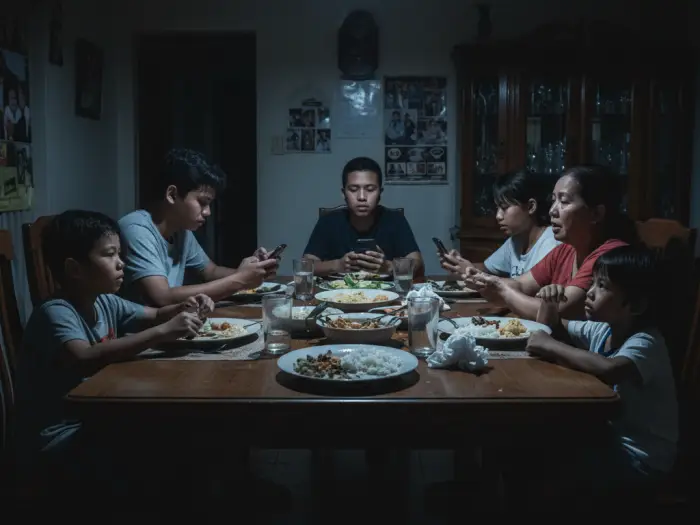
⚖️ Balancing Act: The Downsides We Need to Manage
While the benefits of social media in Filipino families are undeniable, it’s equally important to talk about the challenges that come with being online all the time. After all, too much of a good thing can also create problems inside the household.
One common issue is phubbing-that moment when someone ignores family members at the dinner table because they’re too busy scrolling through their feed. What should be quality bonding time can quickly turn into silence, with each person trapped in their own digital bubble.
There are also risks for kids and teens. Cyberbullying, exposure to unsafe content, and even online predators are real threats in today’s digital world. Meanwhile, parents and elders may fall into the trap of sharing fake news or getting into heated political debates in family group chats, leading to tension or misunderstandings.
Emotionally, constant social media use can create comparison and envy. Seeing neighbors or classmates post about achievements and material things might pressure teens-or even adults-to measure their self-worth against curated online images. This “inggit factor” is something many Filipinos quietly deal with.
The key diskarte is awareness and balance. Families can set simple rules like “no phones during meals,” limit screen time for kids, or schedule weekly offline bonding activities. By doing so, households can enjoy the many perks of social media while avoiding the pitfalls that come with overuse.
✅ Practical Tips for Healthy Social Media Use in Filipino Families
The best way to enjoy the benefits of social media in Filipino families is to set healthy boundaries that protect relationships while keeping digital life fun and useful. Small, intentional habits can make a big difference in how families connect online and offline.
1. Set “device-free” family times.
Meals, prayer time, or family movie nights can be declared gadget-free. This ensures that kwento and laughter stay at the center of bonding, not endless scrolling.
2. Create shared online activities.
Instead of fighting over screen time, make social media a collective experience. Join TikTok challenges together, record a family vlog, or build a shared Google Photos album for milestones. These activities turn tech into tools for closeness.
3. Teach kids responsible posting.
Parents should guide children on what’s safe to share online. Explain the risks of oversharing personal details, and remind them that the internet never forgets. Think of it as digital “manners” training.
4. Respect each generation’s space.
Teens might not want their parents commenting on every post, while lolo and lola may need help avoiding scams. Balance comes from respecting differences while still finding ways to interact meaningfully online.
5. Use built-in tools for balance.
Most phones now have parental controls, screen time trackers, and privacy settings. Families can agree on limits-like no more than 2 hours of social media a day for kids-without feeling too strict.
By applying these simple rules, Filipino households can maximize the good-constant connection, shared joy, easier communication-while avoiding the negatives. After all, social media should enhance family life, not replace it.
🔮 Looking Ahead: The Future of Filipino Families Online
As technology continues to evolve, so will the benefits of social media in Filipino families. What started with Friendster and early Facebook days has now grown into a digital lifestyle where TikTok dances, livestream shopping, and family GCs are part of daily routines. But this is just the beginning.
Experts predict that short-form videos, AI-driven recommendations, and even virtual or augmented reality could soon shape how Filipino households connect. Imagine attending a birthday party in the province through a VR headset, or joining a family reunion where half the members are physically present while the rest join digitally from abroad. For OFW families, these innovations could make distance feel even smaller.
At the same time, new challenges will come. More screen time might compete with traditional bonding, and the pressure of always being “online” could weigh heavily on younger generations. This makes digital literacy and responsible use even more important in the years ahead.
One thing, however, will never change: the Filipino family’s core values of love, faith, and bayanihan. Social media may evolve, but as long as families use it with intention and diskarte, it will continue to be a powerful ally in keeping our bonds strong-whether across the table, across the street, or across the globe.
❓FAQs About the Benefits of Social Media in Filipino Families
1. What are the main benefits of social media in Filipino families?
It allows families to stay connected anytime, whether they live in the same barangay or across the globe. Social media also makes sharing milestones, updates, and daily kwento faster and easier.
2. How do OFWs use social media to connect with their loved ones?
OFWs use Messenger, Viber, and WhatsApp for video calls, group chats, and instant updates. These tools help them feel present in family life despite being far away.
3. Can social media really strengthen Filipino family values?
Yes, social media supports bayanihan through donation drives and helps keep traditions alive with online misa or fiesta livestreams. It becomes a platform where faith, culture, and family unity continue to thrive.
4. What are the risks of too much social media at home?
Families risk losing face-to-face bonding when everyone is glued to screens. Overuse can also expose kids to unsafe content or spark tension in family group chats.
5. How much screen time is healthy for kids and teens?
Experts suggest limiting recreational screen time to about 2 hours a day. Balance is key-kids also need time for school, chores, and play.
6. How can parents guide kids on responsible social media use?
Parents should set house rules, explain online risks, and model healthy habits themselves. Simple reminders about privacy and respectful posting go a long way.
7. How do grandparents benefit from social media?
They reconnect with old friends, join online communities, and bond with their apos through chats and video calls. For many lolos and lolas, it’s a way to feel included in modern family life.
8. What’s the role of family group chats (GCs)?
Family GCs act as digital tambayans where relatives share updates, emergencies, or jokes. They keep everyone in the loop no matter where they are.
9. Is social media more helpful or harmful to Filipino families?
It’s more helpful when used with awareness and balance. The benefits outweigh the risks if families set boundaries and use it to strengthen relationships.
10. What simple tips can make social media healthier for families?
Set device-free times during meals or bonding moments, and enjoy online activities together. Respect each generation’s space and use parental controls when needed.
For all its flaws, social media has become one of the strongest bridges in Filipino family life. It keeps OFWs close to their children, gives grandparents new ways to bond with apo, and turns ordinary days into shared moments worth remembering. The true benefit of social media in Filipino families lies not just in the apps we use, but in how we choose to use them-whether it’s for laughter, love, or bayanihan.
Yes, there are risks: too much screen time, fake news, and even misunderstandings online. But with awareness, balance, and a little diskarte, families can enjoy the perks while keeping the pitfalls in check. At the end of the day, technology should serve us-not the other way around.
So ask yourself: how has social media shaped your own family? Maybe it’s time to try one of the healthy habits we shared, or start a conversation with your loved ones about how to make digital life more meaningful. Because whether online or offline, the heart of every Filipino family will always be connection.
🧭 References
-
Camella – Impact of Social Media on Filipinos
-
LPU Laguna – Facebook and OFW Family Ties
-
Academia.edu – Social Media and Family Relationships
-
World Vision – Life Outside the Screen



